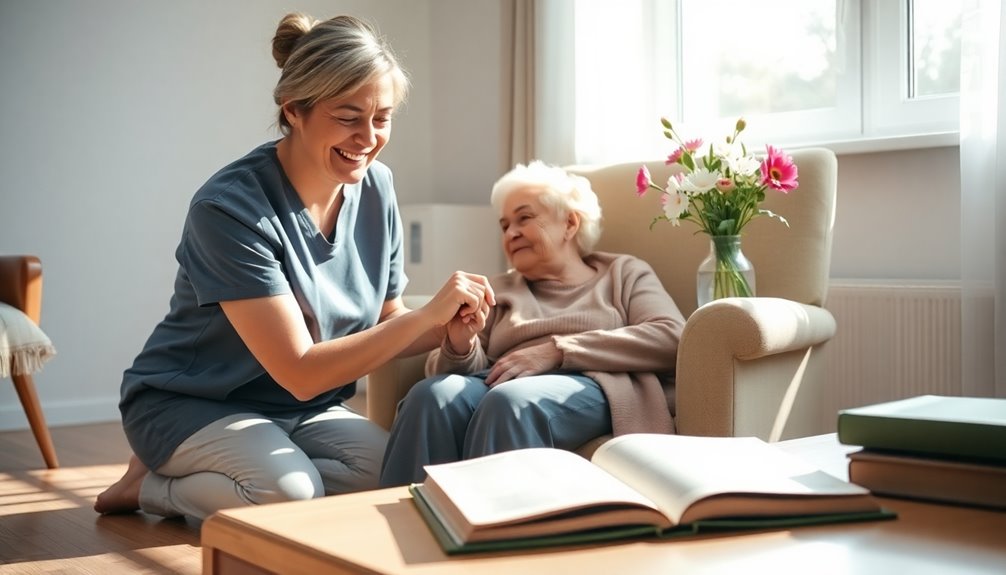A caregiver supports individuals with daily living tasks, like bathing, grooming, and cooking. You provide companionship, emotional support, and monitor health changes. Your role includes coordinating with healthcare professionals, managing medication schedules, and ensuring safety at home. You advocate for your client's rights and preferences while promoting a healthy lifestyle. With your help, clients can maintain their dignity and well-being. There's even more to discover about the varied responsibilities of caregivers that might surprise you.
Key Takeaways
- Caregivers assist with daily living activities, including personal hygiene, meal preparation, and mobility support to enhance the client's quality of life.
- They provide emotional support and companionship to alleviate loneliness and foster connections with the care recipient.
- Communication with healthcare professionals and family members ensures coordinated care and updates on the client's health status and care plan.
- Caregivers monitor changes in the client's condition, advocate for their needs, and manage medication schedules to ensure safety and well-being.
- They engage in recreational activities and promote social interaction to enhance mental well-being and reduce feelings of isolation.
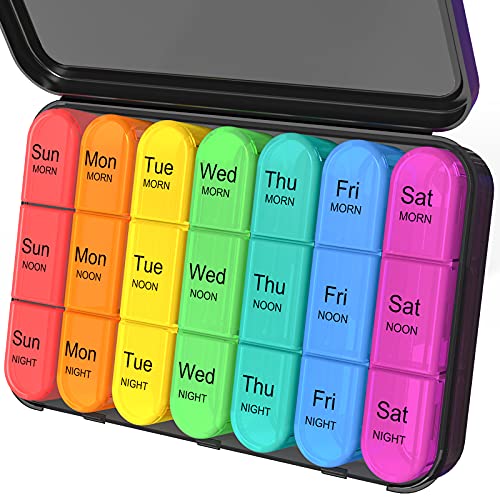
Daviky Pill Organizer 3 Times a Day, Daily Pill Box 7 Day, Weekly Cases Medicine Organizers to Hold Vitamins and Medication
Carry More but Portable – Overall 8''x 5''x 1.4'' and 4.8" x 1.2" x 1'' for each compartment,…
As an affiliate, we earn on qualifying purchases.
As an affiliate, we earn on qualifying purchases.
Understanding the Role of a Caregiver
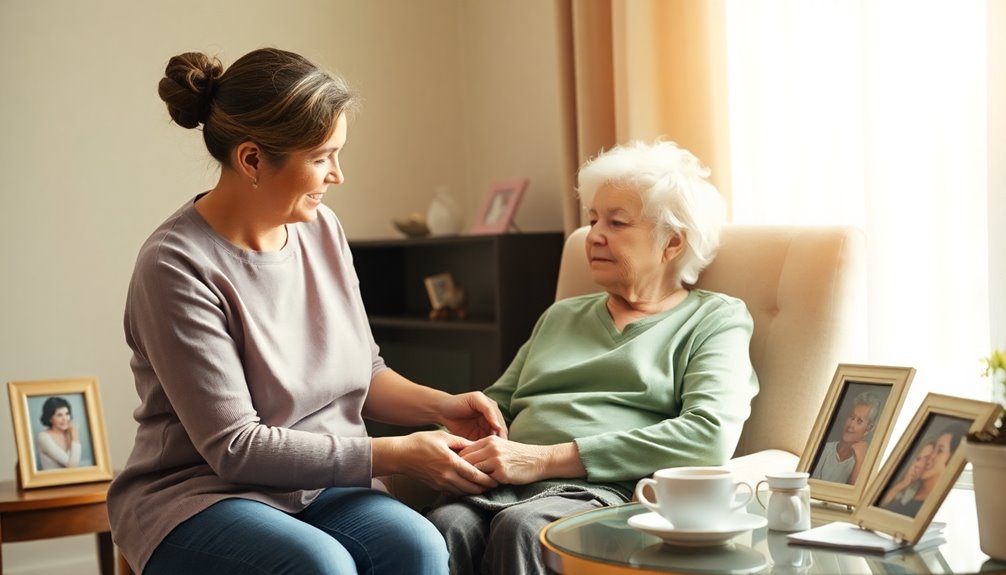
Understanding the role of a caregiver is fundamental, especially since you play an important part in the daily lives of those you assist. Your caregiver duties and responsibilities encompass providing personal care, like helping with bathing, grooming, and meal preparation.
You guarantee that individuals maintain their hygiene and nutritional needs, contributing considerably to their well-being. Beyond physical assistance, you offer emotional support, alleviating feelings of loneliness and fostering meaningful connections.
You also monitor medication schedules, administer prescribed medications, and watch for any side effects. Maintaining a safe environment is essential too; you identify hazards and help with mobility to prevent accidents.
Communicating effectively with healthcare professionals helps coordinate care plans, making your role even more critical in the lives you touch.

MagiDeal Vinyl Quote Me Long Anti-Slip Curve Handled Bath Body Brush, Easy Reach for Seniors, Suitable for Elderly/Pregnant Aid Bathing & Shower, Blue, 15.35"
【LONG HANDLE BRUSH】The bath brush let applying lotion to the backside just got easier. Designed to prevent pain…
As an affiliate, we earn on qualifying purchases.
As an affiliate, we earn on qualifying purchases.
Key Responsibilities of Caregivers
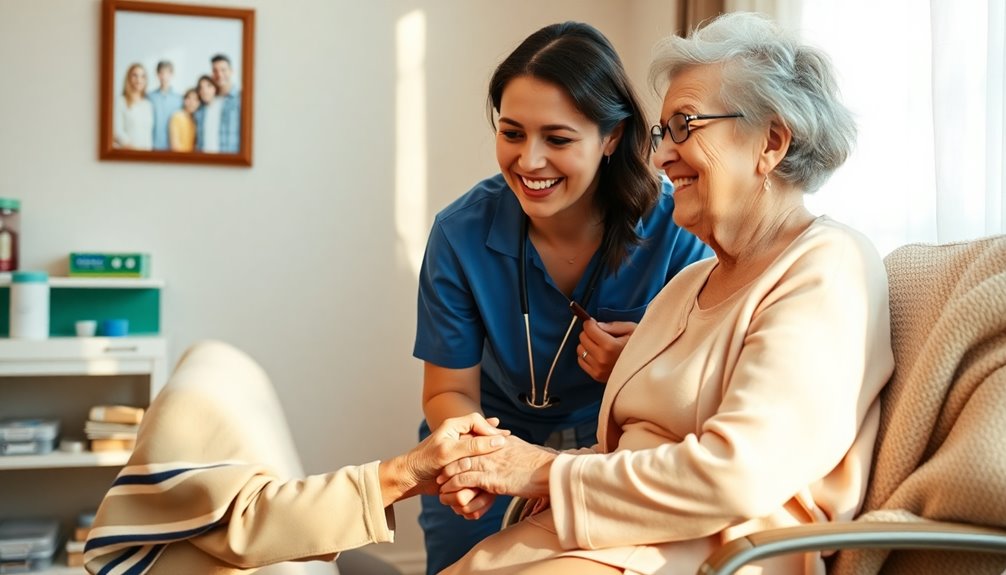
Caregivers play an important role in the daily lives of those they assist, taking on several key responsibilities that guarantee their clients' well-being.
In caregiving, you guarantee personal hygiene by helping with bathing, grooming, and dressing, preserving your clients' dignity. You manage medication schedules, administering prescribed medications while monitoring side effects and communicating concerns to healthcare professionals.
Preparing nutritious meals tailored to dietary needs promotes overall health, and you assist with mobility to prevent falls, a common risk among the elderly.
Additionally, you provide crucial emotional support, engaging in meaningful conversations and activities that combat loneliness.
These responsibilities not only enhance your clients' quality of life but also create a nurturing environment for their physical and emotional needs.

Stand Assist Aid for Elderly; Couch Stand Assist Rail; Mobility Aids Standing Support for Seniors; Assist to Getting Up from Couch Toilet; Height Adjustable 30'' to 36'' ; Weight 5lbs, Bear 350lbs
FSA or HSA Eligible Stand Assist & Mobility Cane – This standing up assist aid is less bulky…
As an affiliate, we earn on qualifying purchases.
As an affiliate, we earn on qualifying purchases.
Daily Living Assistance and Support
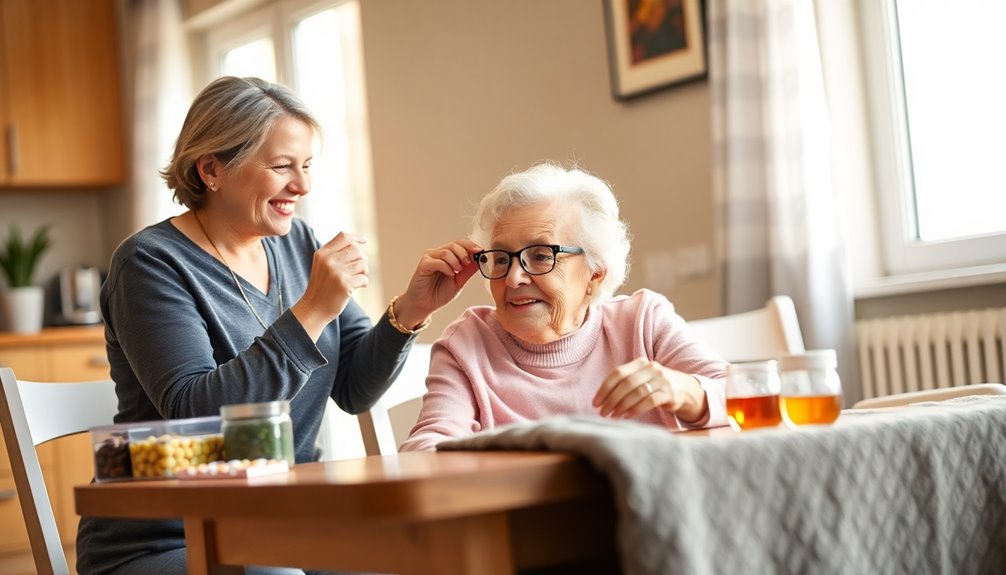
As a caregiver, you play an essential role in helping clients maintain their personal hygiene and overall well-being.
You prepare nutritious meals that cater to their dietary needs, ensuring they stay healthy and energized.
Personal Hygiene Assistance
Personal hygiene assistance plays an important role in helping seniors maintain their dignity and comfort while promoting their overall health.
As a caregiver, your responsibilities include supporting seniors with bathing, grooming, and dressing activities. You also assist with toileting needs, ensuring the process remains respectful and private.
Regular personal hygiene care helps prevent infections and skin issues, greatly contributing to their overall health and well-being.
Approaching these tasks with patience and empathy fosters trust, allowing you to build a positive relationship with those you assist.
Meal Preparation Support
When it comes to meal preparation support, guaranteeing seniors receive nutritious meals tailored to their dietary needs is essential for their health and well-being.
Caregivers provide assistance with meal planning by selecting recipes that accommodate dietary restrictions and creating shopping lists for necessary ingredients. They prepare balanced meals to enhance nutritional intake, while also maintaining hygiene and safety standards in food preparation areas to prevent foodborne illnesses.
Additionally, caregivers may help clients eat by offering physical assistance or modifying meals to guarantee easier consumption. They closely monitor clients' nutritional intake and hydration, noting any changes in appetite or dietary needs, and communicate these observations to family members or healthcare professionals as needed to guarantee ongoing care.

Wefaner Toilet Aids Set for Wiping – Long Handle Butt Wiper, Anti-Slip Curved Handle Bath Body Brush and Curve Hair Brush for People Overweight, Elderly and Disabled People(3PCS Personal Hygiene Kit)
【Affordable 3 Piece Set】The package includes a bottom buddy wiping aid,a Curve Long Handle Brush and a hair…
As an affiliate, we earn on qualifying purchases.
As an affiliate, we earn on qualifying purchases.
Communication and Coordination With Healthcare Professionals

As a caregiver, you play an essential role in updating care plans and coordinating medications for your elderly client.
Keeping healthcare professionals informed about any changes guarantees that care remains tailored to their needs.
Care Plan Updates
Effective communication and coordination with healthcare professionals are essential for updating care plans. As a caregiver, you play a crucial role in relaying changes in your client's health status, ensuring timely care plan updates.
Regularly documenting and sharing observations about daily activities and preferences helps coordinate care among various healthcare settings, including doctors, nurses, and therapists. By doing this, you facilitate a holistic approach to your client's well-being.
Your insights can also help identify potential medication interactions or side effects, allowing for proactive management of health issues. Collaborating closely with healthcare professionals enhances the effectiveness of the caregiving tasks you perform, ultimately leading to better outcomes for your client.
Medication Coordination
Updating care plans directly ties into the essential task of medication coordination. As a caregiver, you play an important role in managing medication schedules, ensuring timely and accurate dosing for seniors.
Your communication with healthcare professionals is critical for adjusting treatment plans based on any changes in health or side effects. You also keep detailed records of medication administration, which helps providers make informed decisions.
Consider these responsibilities:
- Organizing daily medication schedules
- Reporting side effects to doctors
- Keeping track of dosages
- Refilling prescriptions on time
- Clarifying medication instructions
Additionally, understanding the connection between dental health and headaches can be important for managing overall well-being, as it may affect medication needs.
Emotional Support and Companionship

When you think about the role of a caregiver, emotional support and companionship often stand out as essential components. By actively listening and fostering trust, you create a safe space for clients to share their feelings. Engaging in meaningful conversations and activities helps combat loneliness, a common issue among the elderly. Additionally, incorporating shared activities can enhance the bond and create a sense of community among those you care for.
| Emotional Support Actions | Benefits |
|---|---|
| Active listening | Builds trust |
| Shared activities | Reduces feelings of isolation |
| Encouraging social interactions | Promotes a sense of belonging |
| Meaningful conversations | Enhances mental well-being |
| Fun outings | Improves quality of life |
Your companionship can greatly reduce symptoms of depression and anxiety, enriching the daily lives of seniors and enhancing their overall emotional health.
Safety and Home Management
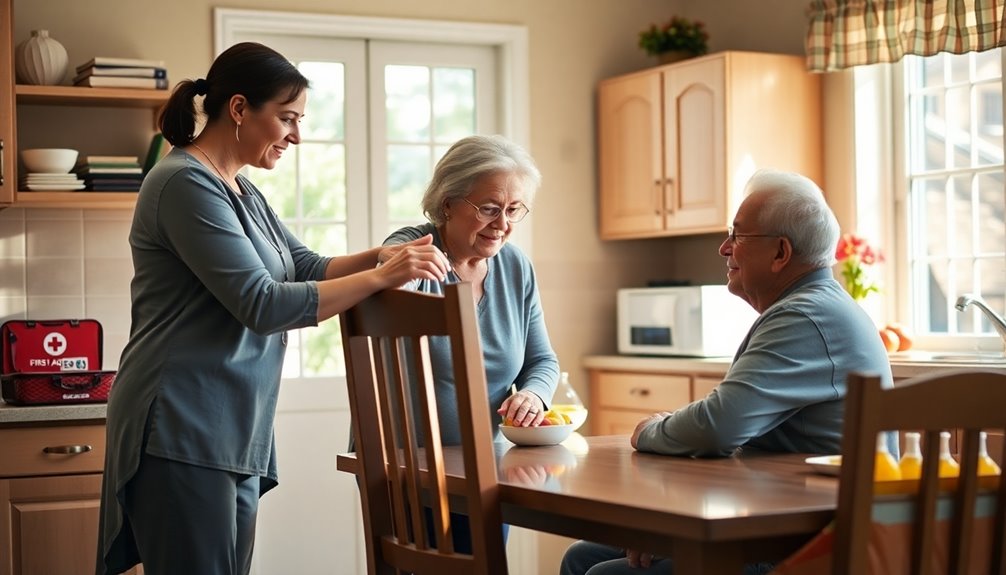
Ensuring the safety and comfort of those you care for is a fundamental responsibility of a caregiver. You'll need to identify and mitigate hazards in the home, which may include:
- Rearranging furniture for easy navigation
- Installing grab bars in the bathroom
- Keeping floors clutter-free and clean
- Conducting regular checks on smoke and carbon monoxide alarms
- Developing customized emergency plans
In addition to promoting safety, you also assist with home management tasks. This includes basic cleaning, laundry, and minor repairs, all aimed at creating a safe living environment. Regular interaction with pets can also provide emotional support, enhancing emotional well-being for those you care for.
You monitor their overall well-being, reporting any changes in health or mood to family members or healthcare professionals, ensuring their care needs are met effectively.
Frequently Asked Questions
What Is the Main Responsibility of a Caregiver?
The main responsibility of a caregiver is to support clients in their daily activities, ensuring they maintain their dignity and well-being.
You help with tasks like bathing, dressing, and grooming, while also providing emotional support to combat loneliness.
You'll manage medication schedules, prepare nutritious meals tailored to their needs, and monitor their health.
Your role is essential in creating a safe, compassionate environment that promotes overall health and happiness for those you care for.
What Are Caregivers Not Allowed to Do?
Caregivers aren't allowed to administer medications that aren't prescribed for the client or change their medication regimen without consulting a healthcare professional.
You can't perform medical procedures requiring licenses, like injections or complex wound care. Financial decisions are off-limits unless you have legal authorization.
Additionally, you shouldn't physically or chemically restrain clients unless specific guidelines are met, and you must always respect their privacy and confidentiality regarding personal health information.
How Much Do Family Members Get Paid for Caregiving?
When you step into the rewarding role of family caregiving, you might wonder about the financial perks.
Family members often receive between $10 to $25 per hour, depending on care complexity and location. If you're dedicating full-time hours, your annual compensation could reach around $26,000.
Some states even offer financial assistance programs, plus you can explore tax relief options that lighten your out-of-pocket expenses while you care for your loved ones.
What Is the Duty of Care for Caregivers?
The duty of care for caregivers means you've got a legal and ethical responsibility to guarantee the safety and well-being of those you assist.
You must act in your client's best interest, preventing harm and providing the necessary care while respecting their dignity.
It's vital to maintain confidentiality and monitor their health closely, reporting any changes.
Upholding this duty protects both you and your clients from potential legal issues, ensuring a trustworthy relationship.
Conclusion
In a world where caregivers are the unsung heroes, you're not just helping; you're transforming lives with every gentle touch and kind word. You're the lifeline, the beacon of hope, and the steady hand guiding those in need. Your role is nothing short of miraculous, making ordinary days extraordinary. With your unwavering support, you're creating a safe haven, a sanctuary of love and care that shines brighter than a thousand stars in the night sky.
